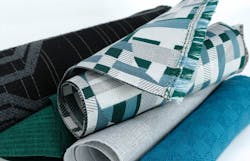How Duvaltex Created the Industry’s First Biodegradable Polyester
When you throw away old carpet, furniture or upholstery, more likely than not, it’s headed to a landfill. In 2015, the recycling rate for all textiles was only 15.3%, according to the U.S. Environmental Protection Agency (EPA).
That same year, landfills received 10.5 million tons of municipal solid waste textiles (e.g. discarded clothing, furniture, carpets, etc.).
Once these textiles are in landfills, the natural fibers can take hundreds of years to decompose—while synthetic fibers are designed not to decompose at all. In 2013, the EPA also reported that 55 million pounds of synthetic plastic textiles are sent to landfills every day in the U.S.
[Read also: Roundtable 101 for Design Connections 2.0]
The EPA says that current textile recycling, including clothing, has a greater impact on reducing greenhouse gases than the recycling of plastic, yard waste and glass. The weight of recycled textiles in 2014 (2.6 million tons) was equal to taking 1.3 million cars off the road.
“We face a major problem,” says Jean-Pierre Simard, vice president of marketing for contract textile manufacturer Duvaltex.
Alarming statistics about textiles in landfills continue to motivate designers to choose more sustainable products—reducing their carbon footprint in the process. That’s why Duvaltex created its CLEAN IMPACT TEXTILES collection, which was first introduced at NeoCon 2019 in Chicago.
A New Kind of Polyester
“Through all of our manufacturing processes, we reduce waste everywhere we can,” says Simard. He adds that the company, when conceptualizing the CLEAN IMPACT collection, wondered: “How can we go further? What kind of better impact can we have on the environment?”
The CLEAN IMPACT collection includes the first recycled biodegradable polyester textile for commercial interiors, according to Duvaltex. Traditionally, polyester is a synthetic fabric—but CLEAN IMPACT polyester can biodegrade in landfills and wastewater conditions.
[Related: Next-Generation Designers Offer Insight into Future of Design]
CLEAN IMPACT’s polyester is biodegradable because of the addition of a biocatalyst in the yarn extrusion process. That allows microbes in landfills to digest the fabric “at a rate similar to that of natural fibers,” according to Duvaltex’s press release, because the microbes recognize the biopolymer in the plastic.
“If it’s going in a landfill, it’s going to biodegrade in a few years instead of a few centuries,” says Simard.
Design Still at the Forefront
Simard says CLEAN IMPACT is ideal for acoustic panels and a wide range of seating applications. The collection comprises five upholstery patterns, all playing on horizontal and vertical lines, from a grid look to overlapping lines to a crisscross pattern.
Colors include forest green, desert mesa red, coral, deep blue, as well as a range of light to dark neutrals. (Photo courtesy of Duvaltex)
“This collection of fabrics represents eco-efficiency by design at its best, and a crucial step in reducing the negative impact of a linear economy," says Alain Duval, CEO of Duvaltex, in a press release.
Simard says the collection will be commercially available this fall and available to all shoppers early 2020.
Read this next: How to Bring Children’s Library Design Into the 21st Century

